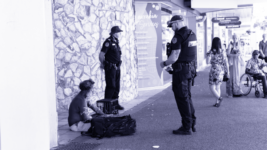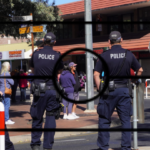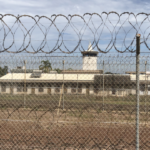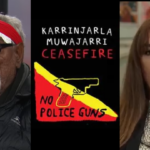The Northern Territory Country Liberals Are Creating an Incarceration Jurisdiction

The imprisonment rate in the Northern Territory currently sits at 1,381.6 persons per every 100,000 adults, which when compared with imprisonment rates of nation’s across the planet comes in at second place behind El Salvador, which incarcerates 1,659 persons per every 100,000 adults in its Central American nation.
Since coming to power on 28 August 2024, the Northern Territory Country Liberal government has been doing it’s darndest to bump up its prisoner population as much as it can. In fact, it’s been quite clear about what it is up to, and by all accounts it’s doing a fine job.
Prior to the Finocchiaro government taking office, the Australian Bureau of Statistics reports that in the June quarter of 2024, 2,217 adults were behind bars in the NT, but by the March quarter this year, there were 2,686 inmates in its prison system, which marks a 21 percent rise in the number of inmates over the Country Liberal’s time in office in the Australian self-governing territory.
The NT has the largest portion of its population made up of First Peoples compared to any Australian jurisdiction, and in this settler colonial nation, this fact goes a long way to explaining why there are so many people in gaol. The 2021 Census outlines that 76,487 First Nations people accounted for 30 percent of the broader Territorian population of 248,151 people.
Of the 2,686 adults locked up in the NT in March, 2,373 were Aboriginal and/or Torres Strait Islander adults, which accounted for 88 percent of the jurisdiction’s adult prisoner population.
Two plainclothes Northern Territory police officers killed a 24-year-old Warlpiri man with disabilities in Coles Alice Springs last month, and while the authorities have gone into lockdown regarding the details, apparently, the officers held the man face down, applying pressure until he stopped breathing. Then a 68-year-old Wadeye elder taken into police custody died in hospital last weekend.
Led by chief minister Lia Finocchiaro, the NT Country Liberals are continuing to claim to have inherited a bad situation from the Territory Labor Party, and certainly, glancing back at the custody figures under the previous governance, that was the case.
However, instead of trying to improve the overpolicing and overincarceration issue in the NT, Finocchiaro is making it a whole lot worse to the point that it seems her ministry has declared war on the First Peoples of the region.
Designed to punish and incarcerate
Finocchiaro had been calling for a crackdown on bail laws, and in particular, youth bail laws since 2022, and during the Country Liberal’s successful election campaign last year, it was promising to get tough on crime. However, no one had quite expected the reactionary party to introduce five pieces of law-and-order legislation into NT parliament on its second sitting day in office.
The Bail Legislation Amendment Bill 2024 reinstated a breach of bail offence for youths, it tweaked the bail regime so that it applies to youth in the same way that it does to adults, and it expanded the number of criminal offences that carry a presumption against bail, while ensuring that this measure applies to kids as well as adults.
In the June quarter 2024, prior to Finocchiaro’s overhaul of the NT bail regime, 949 adults were on remand, or being held prior to conviction or sentencing, but in the March quarter this year, the number of unsentenced prisoners was at 1,269, which marks a 33 percent rise in adults on remand, while it also means that 47 percent of the entire prisoner population in the Territory is on remand.
In terms of youth prison figures, 33 children were being held in NT child prisons on 31 March this year, with 30 of them, or 90 percent, being First Nations kids, while 19 of these youths, or 57 percent, were on remand.
The bundle of law-and-order bills passed last October further served to lower the age of criminality, or when a child can be convicted and imprisoned, back down to 10 from 12 years old, after it had been raised two years prior, and it also saw a new public drunkenness offence enacted, along with the introduction of a mandatory sentencing regime relating to assaults charges.
An authority other than that in the NT
Central Land Council chair Warren Williams told the ABC this week that the Aboriginal communities that his council represents “don’t trust this government and its police force to keep us safe”, while Northern Land Council chair Mathew Ryan said that local First Nations people “fear police instead of trusting they will protect and serve their communities”.
The North Australian Aboriginal Justice Agency (NAAJA) outlined in February that around 40 Aboriginal people were being taken into custody on a daily basis in the Northern Territory.
And the sense that the Finocchiaro government and the NT police force are working against Aboriginal communities in the NT was only heightened by the 27 May killing of Kumanjayi White by two police officers in a supermarket in Mparntwe-Alice Springs. White, who lived in assisted state care because of his disabilities, had his life ended by police brutality over suggested shoplifting.
White hailed from the remote Aboriginal community of Yuendumu, which is where 19-year-old Warlpiri man Kumanjayi Walker was shot dead by then NT police constable Zachary Rolfe in highly questionable circumstances that led to an acquittal.
Just days after the incident, federal Indigenous affairs minister Malarndirri McCarthy made the unusual move of calling for an independent investigation into the killing of Kumanjayi White, so that NT police would not be investigating its own.
However, Finocchiaro said that after she’d spoken to McCarthy, she’d found the exchange “really unhelpful” and “uneducated”. And the NT chief minister, who is also the local police minister, attempted to shift the conversation this week, in announcing that she would be trialling the legal use of Oleoresin Capsicum (OC) spray, or pepper spray, for Territorian civilian use starting in September.
Federal Labor MP for Lingiari Marion Scrymgour has spoken out in favour of an independent investigation, calling for the Australian federal police to be charged with it, explaining that it’s “a job which only police can undertake, because at the end of the day, it has to be a police decision to charge”.
NAAJA acting chief executive Anthony Beven joined the calls for the federal government to intervene in the investigation of the killing of Kumanjayi White, as well as the law-and-order breakdown in the Territory, suggesting that a forum take place between First Nations communities, the federal government and the NT Country Liberals.
PM attempts to skirt the issue
On being quizzed in regard to the two custody deaths and the mass incarceration of First Peoples in the NT at the National Press Club on 10 June, Australian prime minister Anthony Albanese first stated that it wasn’t just his fault as “all governments have not done well enough in any of these areas”, and he then raised the unsuccessful Voice referendum as proof that he’d given it a shot but failed.
“Now, in general, the idea of federal intervention, which is, frankly, an easy thing that people come up with. You know, why aren’t you sending the AFP? Why aren’t you doing that, without them saying where it leads,” the PM waffled. “I need to be convinced that people in Canberra know better than people in the Northern Territory about how to deal with these issues, is my starting point.”
Senator Lidia Thorpe called the PM’s response a “cop-out” and added that he can’t blame the failure of the Voice referendum for his lack of any action on deaths in custody. And she rolled out a list of different approaches Albanese could take in attempting to deal with the situation, which included implementing the 1991 Royal Commission into Aboriginal Deaths in Custody recommendations.
“How can he argue that NT police are better placed to investigate this case than an independent body, when the inquest into Kumanjayi Walker’s death exposed entrenched racism within that very police force, and when the NT government has been pursuing a cruel, punitive approach to law and order, which they know disproportionately harms First Peoples?” Thorpe questioned.
“The NT government’s approach in this space is subject to complaints to the UN,” the Gunnai, Gunditjmara and Djab Wurrung senator underscored.
“The NT government and NT police are not up to the job and do not have the trust of the community.”







